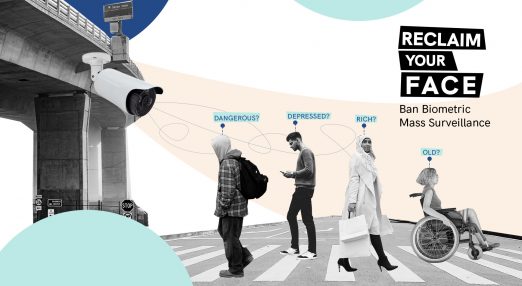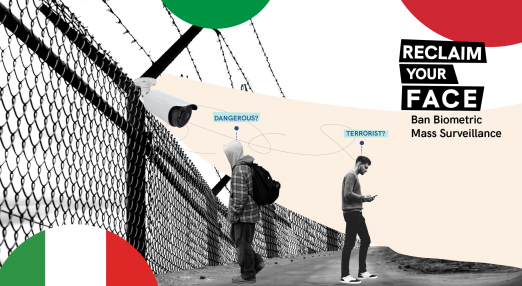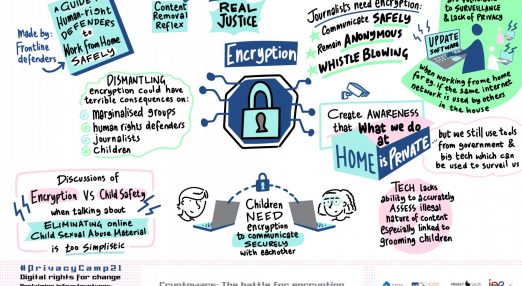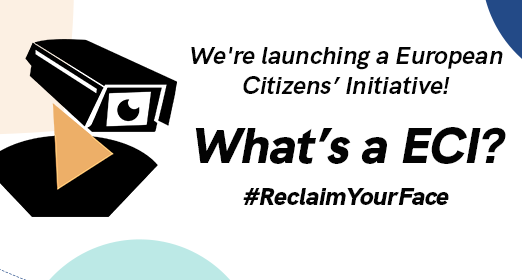surveillance
Filter by...
-

Mass facial recognition is the apparatus of police states and must be regulated
Scientists have shown the inherent structural discrimination embedded in biometric systems. Facial analysis algorithms consistently judge black faces to be angrier and more threatening than white faces. We also know that biometric systems are designed with a purportedly “neutral” face and body in mind, which can exclude people with disabilities and anybody that does not conform to an arbitrary norm.
Read more
-

Chilling use of face recognition at Italian borders shows why we must ban biometric mass surveillance
As part of Reclaim Your Face's investigation in rights-violating deployments of biometric mass surveillance, EDRi member Hermes Center explains how the Italian Police are deploying dehumanising biometric systems against people at Italy’s border.
Read more
-

Huawei captures Balkan’s hearts and minds
EDRi member Citizen D reveals Huawei's lobbying practices in Slovenia, where media outliets are siding with the Chinese tech company, whilst ignoring the company's human rights violations in China and the development of a city surveillance system in Belgrade.
Read more
-

Wiretapping children’s private communications: Four sets of fundamental rights problems for children (and everyone else)
On 27 July 2020, the European Commission published a Communication on an EU strategy for a more effective fight against child sexual abuse material (CSAM). As a long-term proposal is expected to be released by this summer, we review some of the fundamental rights issues posed by the initiatives that push for the scan of all private communications.
Read more
-

12 benchmarks for the reform and oversight of intelligence services in Austria
EDRi member epicenter.works presents the benchmarks against which the new reform of the Austrian Federal Agency for State Protection and Counterterrorism must be measured. With these criteria, guided strongly by international standards and jurisdiction, epicenter.works expect the legislative proposals on the reform in the next few weeks, ready to defend fundamental human rights.
Read more
-

#PrivacyCamp21: Event Summary
The theme of the 9th edition of Privacy Camp was "Digital rights for change: Reclaiming infrastructures, repairing the future" and included thirteen sessions on a variety of topics. The event was attended by 250 people. If you missed the event or want a reminder of what happened in the session, find the session summaries below.
Read more
-

Looking for a New Years’ Resolution? #ReclaimYourFace with our citizens’ initiative!
Since its launch just 2 months ago, the Reclaim Your Face campaign to ban biometric mass surveillance has gone from strength to strength. Already 23 organisations have joined the coalition, and almost 13,000 people have joined the movement – and this is only the beginning.
Read more
-

Press release: EDRi network launches public initiative against biometric mass surveillance
On 7 January, the European Commission registered a new European Citizens’ Initiative (ECI), the ‘Civil society initiative for a ban on biometric mass surveillance practices’.
Read more
-

The EU’s attempt to regulate Big Tech: What it brings and what is missing
This week, the European Commission has proposed two long-awaited pieces of digital legislation, the Digital Services Act and the Digital Markets Act. Despite a number of good provisions, there are also major shortcomings which must be addressed to guarantee the protection of digital rights.
Read more
-

Big Tech’s dominance: only laws can limit its power
Big Tech companies like Facebook have grown so large that the U.S. antitrust authority F.T.C. is considering breaking them up. We need laws that limit the power tech firms wields over our lives.
Read more
-

The slippery slope of COVID health passports
There is increasing talk of measures that allow or restrict passengers at the departure gate based on health data. Can you show proof of vaccination? Then you may pass. Do you have a recent, negative test result? Then you may enter. Are you unable or unwilling to show these? Then you are denied access. There’s an understandable rationale that underpins these scenarios: we want to create a safe environment. Yet it is also cause for great concern.
Read more
-

Benefiting whom? An overview of companies profiting from “digital welfare”
Could private companies be the only ones really profiting from digital welfare? This overview from EDRi member Privacy International looks at the big players.
Read more
